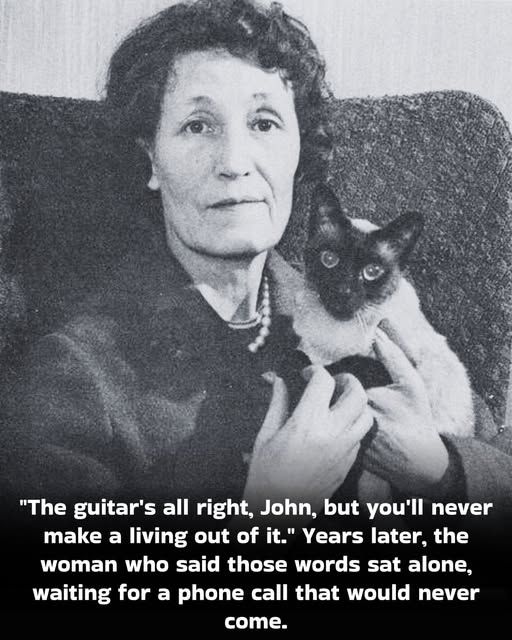“The guitar’s all right, John, but you’ll never make a living out of it

“The guitar’s all right, John, but you’ll never make a living out of it.” Years later, the woman who said those words sat alone, waiting for a phone call that would never come.
Her name was Mary Elizabeth Smith. The world called her Mimi.
And she raised John Lennon.

In 1981, just months after John’s murder, Mimi sat in her bungalow in Dorset, England, and gave an interview. She was 75 years old. Her voice was steady, but her eyes betrayed her.
She was still waiting for him to call.
To understand Mimi and John, you need to understand where it began.

In 1945, when John was five years old, his mother Julia couldn’t care for him. His father had abandoned the family. Julia was young, struggling, living with another man. So Julia’s older sister Mimi took John in.
Mimi and her husband George raised John at 251 Menlove Avenue in Liverpool—a respectable middle-class home that Mimi kept spotless. She was strict. Proper. She believed in discipline, education, and respectability.
John was chaos in human form.

He drew constantly—cartoons, caricatures, strange creatures. He wrote stories. He played pranks. He questioned everything. Mimi would scold him for daydreaming, for his messy room, for his wild imagination.
But she never stopped him.
When John was 16, his mother Julia taught him to play banjo, then guitar. He was obsessed. He’d practice for hours, ignoring homework, ignoring Mimi’s disapproval.

One day, watching him strum that guitar for the hundredth time, Mimi said the words that would become famous:
“The guitar’s all right, John, but you’ll never make a living out of it.”
She meant it practically. She wanted him to have security, a real job, a stable future.
John heard it as a challenge.
In 1958, tragedy struck. Julia was hit by a car and killed. John was 17. He’d only recently reconnected with his mother. The loss devastated him.
Mimi held him together. She became his anchor, even as he rebelled, even as he formed The Beatles, even as he became everything she’d warned against.
When The Beatles exploded into global fame, John never forgot Mimi. He called her constantly. From hotel rooms in America, from recording studios in London, from concert halls around the world—he called.
“Aunt Mimi, you’ll never guess what happened today.”
In 1965, John bought her a bungalow in Poole, Dorset—on the coast, away from the chaos of Liverpool, a place where she could live in peace. He furnished it himself. He visited when he could.
Their relationship was complicated. She didn’t understand his music, his fame, his rebellious public image. She read newspapers calling him controversial, dangerous, anti-establishment.
In interviews, she defended him with the fierce love of someone who’d raised him.
“Don’t talk to me about such things!” she’d say when asked about his radical statements. “I know that boy. He doesn’t know what he’s saying! It’s all an act.”

Then she’d add, with a knowing smile: “If there were a revolution, John would be the first in the queue to run!”
She wasn’t mocking him. She was protecting him. She was reminding the world that beneath the icon was a boy she’d raised—funny, sensitive, scared of conflict despite his tough exterior.
The phone calls continued through the years. Even during John’s “Lost Weekend,” even during his retreat from public life, even when he was raising Sean—he called Mimi.
She was the one constant thread through every version of John Lennon: the angry young rocker, the peace activist, the house husband, the comeback artist.
In 1980, John was planning to visit England. He talked about bringing Sean to meet Mimi. He was working on new music, feeling energized, bubbling with excitement.
“He was coming home,” Mimi would later say. “He was always talking about coming home.”
On December 8, 1980, John Lennon was shot and killed outside his apartment in New York City.
He was 40 years old.
Mimi heard the news at her bungalow in Dorset. The phone didn’t ring. It would never ring again.
In 1981, she agreed to an interview. The footage is heartbreaking to watch.
She sits in her living room, surrounded by photographs of John—young John, teenage John, Beatle John. She’s composed. Dignified. Her voice doesn’t break.
But when she talks about the phone calls, something shifts.
“He’d ring me up,” she says softly. “He was always so excited. ‘Aunt Mimi,’ he’d say, ‘you’ll never guess…'”
She trails off.











